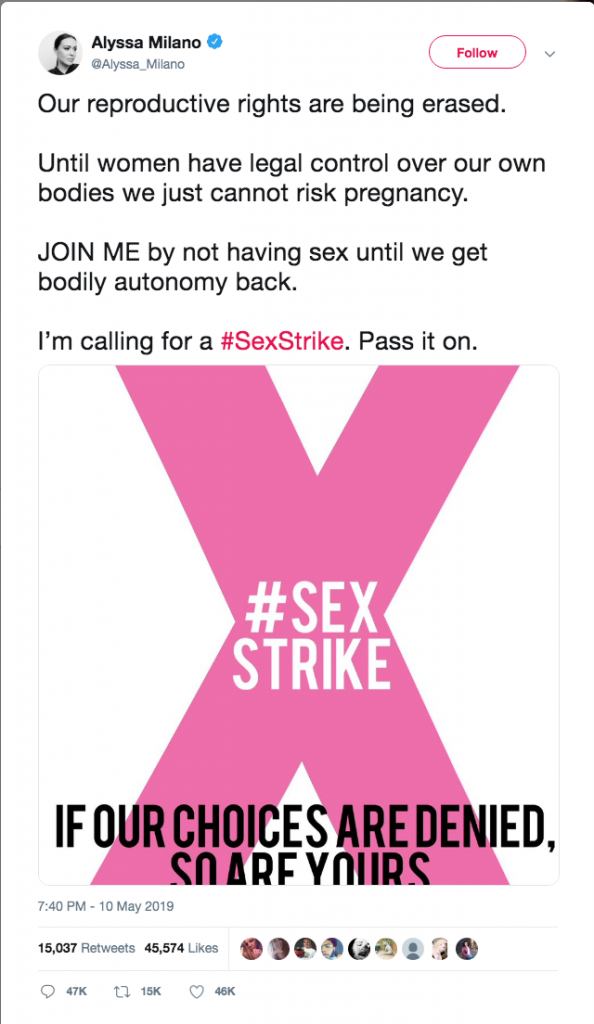By: Gabrielle McLaren, Editor-in-Chief
Content warnings for this piece include: abortion, pregnancy, and sexual violence.
In May, the state of Georgia passed House Bill 481, nicknamed the “heartbeat bill.” Business Insider sums it up nicely: “While the bill’s main goal is to outlaw abortion after five to six weeks of pregnancy, the law’s provisions establish fetuses as full people under the law — meaning women could be held criminally responsible for seeking an abortion or even for having a miscarriage.”
The public outcry coming from both the general public and the medical community in response to this bill is somewhat encouraging. But one proposal from Alyssa Milano, an American actress and #MeToo activist, blew my mind.

This could literally be the plot of an Ancient Greek comedy. At first I was sure this was satire. But no, Milano is proposing that women actually refuse to have sex with men until abortion laws are fixed and women have full access to legal reproductive health services.
I’m going to go ahead and provide a point-form list of why her strategy is flawed because there’s a lot of inherent privilege and discriminatory undertones to unpack.
- There’s a heteronormative, penetration-focused definition of “sex” at work here that makes the entire project inherently non-intersectional. Feminism fails when it isn’t intersectional. It also begs the ever important question: does Milano allow blowjobs?
- Similarly, this line of thought assumes that all women are able to conceive a child as a result of sex — which is untrue for many women with various health conditions, as well as many of our trans* sisters. Motherhood and womanhood need not be so interdependently connected.
- The #SexStrike assumes that women have been giving sex freely to men in the first place, which is not true for many women in abusive relationships.
- This plan really sucks if you’re a woman who legitimately enjoys sex. Since that’s not accounted for, what ends up happening is a reinforcing of the trope that women don’t enjoy sex, and just do it for the benefit of their male partners.
- This plan treats sex as a carrot on a stick for men to run after — “Go fix problematic legislation and your partner will give you a prize.” I think that’s offensive to anyone in a healthy relationship where sex is reciprocal, including men.
- This plan reinforces the idea that women only exist for men to have sex with, and that not having sex with women is a punishment outside of the status quo. A feminist movement shouldn’t share discourse with incels.
- Similarly, weaponizing sex is a slippery slope. Withholding sex to get what you want is a sign of a toxic relationship, and fits into emotional and sexual abuse. Sex with an intimate partner should be about bonds of closeness and mutual gratification, not power and punishment.
- This plan suggests that women only have the power to affect change indirectly. You can deduce from Milano’s tweet that her line of thought is that if women don’t have sex with men, men will get angry and enact political change for them. That’s a disempowering way to view women, who have historically been the main movers and shakers of the reproductive rights movement.
- The strike implies that men should only care about women’s issues when there’s something for them to lose, which isn’t true — women’s rights and women’s health are human rights and public health.
- The #SexStrike seems disconnected from reality. Will one Sex Striker’s decision not to have sex actually reach, impact, influence, or otherwise put pressure on Governor Kemp and other state politicians who have put through these policies? It’s not likely, because it doesn’t take into account the misogyny and motives of the GOP lawmakers behind the bill.
Ultimately, this strike exemplifies ineffective performative activism. Other forms of action, such as letter-writing campaigns, donating to sturdy pre-existing organizations such as Planned Parenthood, or even the film industry’s slow but steady backing out of Georgia are much more effective. These more grounded, less gimmicky methods signal public disapproval to the right people, and actually help the people who are affected by these bills.
Look, I get it, our current world feels as if someone tugged on a stray thread in the fabric of reality and the whole thing is unspooling around us faster and faster. Sometimes it’s hard to figure out how you can even start solving overwhelmingly large social problems. But my gosh, not only is a sex strike not going to fix the Georgian abortion laws, but it relies on and reinforces so many problematic notions about sex, sexuality, womanhood, and consent itself. It’s an important reminder that activism can do more harm than good if applied incorrectly, and that critical intersectional analysis will beat a hashtag any day.




